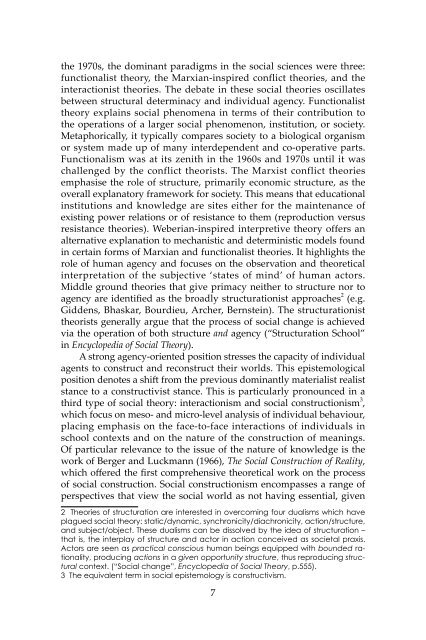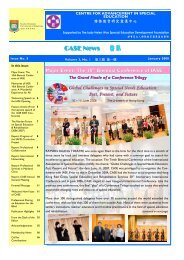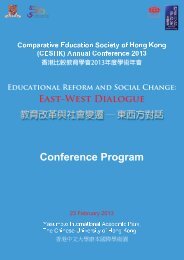Comparative Education Bulletin - Faculty of Education - The ...
Comparative Education Bulletin - Faculty of Education - The ...
Comparative Education Bulletin - Faculty of Education - The ...
You also want an ePaper? Increase the reach of your titles
YUMPU automatically turns print PDFs into web optimized ePapers that Google loves.
the 1970s, the dominant paradigms in the social sciences were three:<br />
functionalist theory, the Marxian-inspired conflict theories, and the<br />
interactionist theories. <strong>The</strong> debate in these social theories oscillates<br />
between structural determinacy and individual agency. Functionalist<br />
theory explains social phenomena in terms <strong>of</strong> their contribution to<br />
the operations <strong>of</strong> a larger social phenomenon, institution, or society.<br />
Metaphorically, it typically compares society to a biological organism<br />
or system made up <strong>of</strong> many interdependent and co-operative parts.<br />
Functionalism was at its zenith in the 1960s and 1970s until it was<br />
challenged by the conflict theorists. <strong>The</strong> Marxist conflict theories<br />
emphasise the role <strong>of</strong> structure, primarily economic structure, as the<br />
overall explanatory framework for society. This means that educational<br />
institutions and knowledge are sites either for the maintenance <strong>of</strong><br />
existing power relations or <strong>of</strong> resistance to them (reproduction versus<br />
resistance theories). Weberian-inspired interpretive theory <strong>of</strong>fers an<br />
alternative explanation to mechanistic and deterministic models found<br />
in certain forms <strong>of</strong> Marxian and functionalist theories. It highlights the<br />
role <strong>of</strong> human agency and focuses on the observation and theoretical<br />
interpretation <strong>of</strong> the subjective ‘states <strong>of</strong> mind’ <strong>of</strong> human actors.<br />
Middle ground theories that give primacy neither to structure nor to<br />
agency are identified as the broadly structurationist approaches 2 (e.g.<br />
Giddens, Bhaskar, Bourdieu, Archer, Bernstein). <strong>The</strong> structurationist<br />
theorists generally argue that the process <strong>of</strong> social change is achieved<br />
via the operation <strong>of</strong> both structure and agency (“Structuration School”<br />
in Encyclopedia <strong>of</strong> Social <strong>The</strong>ory).<br />
A strong agency-oriented position stresses the capacity <strong>of</strong> individual<br />
agents to construct and reconstruct their worlds. This epistemological<br />
position denotes a shift from the previous dominantly materialist realist<br />
stance to a constructivist stance. This is particularly pronounced in a<br />
third type <strong>of</strong> social theory: interactionism and social constructionism 3 ,<br />
which focus on meso- and micro-level analysis <strong>of</strong> individual behaviour,<br />
placing emphasis on the face-to-face interactions <strong>of</strong> individuals in<br />
school contexts and on the nature <strong>of</strong> the construction <strong>of</strong> meanings.<br />
Of particular relevance to the issue <strong>of</strong> the nature <strong>of</strong> knowledge is the<br />
work <strong>of</strong> Berger and Luckmann (1966), <strong>The</strong> Social Construction <strong>of</strong> Reality,<br />
which <strong>of</strong>fered the first comprehensive theoretical work on the process<br />
<strong>of</strong> social construction. Social constructionism encompasses a range <strong>of</strong><br />
perspectives that view the social world as not having essential, given<br />
2 <strong>The</strong>ories <strong>of</strong> structuration are interested in overcoming four dualisms which have<br />
plagued social theory: static/dynamic, synchronicity/diachronicity, action/structure,<br />
and subject/object. <strong>The</strong>se dualisms can be dissolved by the idea <strong>of</strong> structuration –<br />
that is, the interplay <strong>of</strong> structure and actor in action conceived as societal praxis.<br />
Actors are seen as practical conscious human beings equipped with bounded rationality,<br />
producing actions in a given opportunity structure, thus reproducing structural<br />
context. (“Social change”, Encyclopedia <strong>of</strong> Social <strong>The</strong>ory, p.555).<br />
<strong>The</strong> equivalent term in social epistemology is constructivism.<br />
7
















